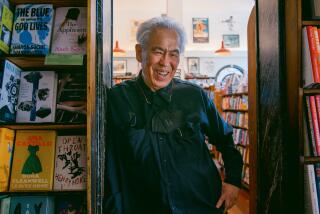DISCOVERIES
Outcast
A Novel
Shimon Ballas, translated from the Hebrew by Ammiel Alcalay and Oz Shelach
City Lights: 210 pp., $13.95 paper
“OUTCAST” is the fictional memoir of Haroun Saussan, an Iraqi academic, a grandfather, a civil engineer and historian, a Jew who converted to Islam and the author of several books, including “The Jews in History” and “My Path to Islam.” Author Shimon Ballas bases his protagonist on Ahmad Soussa, a writer who converted to Islam in the 1930s and whose work, like Saussan’s, was used (perverted) to support Saddam Hussein. Saussan, who does not consider himself an “ideological man” but merely a scholar, is appalled to see his history of the Jews called a “jihad against the Jews.” The novel opens in Iraq, at a ceremony in his honor, attended by the president. Saussan, alienated from his wife and daughter, feels like a stranger in his own home. He remembers his childhood in the Bedouin village of al-Hila, “a sleepy town on the bank of the Euphrates.” He remembers his days as a student in America and his marriage to an American woman. He misses the 2-year-old son he left to return to Iraq alone. He finds himself caught between identities: “a Muslim come from without.” Disturbing dreams help him to unify the disparate parts of his character and soothe his many regrets.
--
The Sirens of Baghdad
A Novel
Yasmina Khadra, translated from the French by John Cullen
Doubleday/Nan Talese: 320 pp., $19.95
THE corruption of the human spirit in times of war is an endlessly compelling theme in fiction. In “The Sirens of Baghdad,” a nameless student at the University of Baghdad is forced, during the American-led invasion, to return home to the village in which he was born. Three occurrences burn the need for revenge into his soul: An American soldier guns down a much-loved mentally ill boy who does not understand his order not to speak or move; an American bomb kills more than a dozen women and children at a local wedding; and American soldiers burst into his home looking for weapons, humiliating the young man’s father in front of the family. The student then goes back to Baghdad and joins a group of radicals, who send him on a mission “a thousand times more awesome than the attacks of September 11.” In this and other novels, Yasmina Khadra (a pseudonym for a former Algerian army officer) brings us deep into the hearts and minds of people living in unspeakable mental anguish. The decision to act, even if it is the wrong path, is Khadra’s most familiar territory.
--
I’jaam
An Iraqi Rhapsody
Sinan Antoon, translated from the Arabic by the author and Rebecca Johnson
City Lights: 98 pp., $11.95 paper
SINAN ANTOON’s novel too is a fictional memoir -- of a student/poet in solitary detention for having ridiculed Saddam Hussein. A guard with literary aspirations gives him some paper and tells him to write. The student remembers his childhood and the young woman he loves. He writes, with contempt, of life under Hussein, concealing his sarcasm by omitting the dots, or diacritics, and thereby changing the meaning of words -- “revolution” becomes “revulsion,” “referendum” becomes “pudendum,” “species” becomes “feces.” (“I’jaam,” the author explains in a note, means “dotting,” and thus “clarifying.”) He refers repeatedly to “our great Leader” and the “National Regress” (instead of National Congress). Raped by his guards, he falls into surreal reverie. The student’s dreams, memories and fantasies are eerily beautiful -- he enters a reality far preferable to the one he has lived in for most of his life.
Antoon is an Iraqi author and filmmaker. In 2003, he co-directed “About Baghdad,” a documentary of Iraq under American occupation.
--
More to Read
Sign up for our Book Club newsletter
Get the latest news, events and more from the Los Angeles Times Book Club, and help us get L.A. reading and talking.
You may occasionally receive promotional content from the Los Angeles Times.






